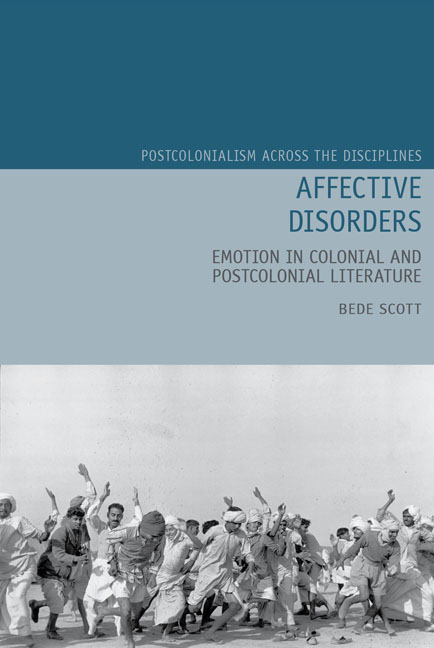Book contents
- Frontmatter
- Dedication
- Contents
- Acknowledgements
- Introduction
- 1 Anger: Naguib Mahfouz's Midaq Alley
- 2 Reticence: Vikram Seth's A Suitable Boy
- 3 Jealousy: Joaquim Maria Machado de Assis’ Dom Casmurro
- 4 Boredom: Upamanyu Chatterjee's English, August: An Indian Story
- 5 Fear: Michael Ondaatje's Anil's Ghost
- 6 Stuplimity: Vikram Chandra's Sacred Games
- Works Cited
- Index
1 - Anger: Naguib Mahfouz's Midaq Alley
- Frontmatter
- Dedication
- Contents
- Acknowledgements
- Introduction
- 1 Anger: Naguib Mahfouz's Midaq Alley
- 2 Reticence: Vikram Seth's A Suitable Boy
- 3 Jealousy: Joaquim Maria Machado de Assis’ Dom Casmurro
- 4 Boredom: Upamanyu Chatterjee's English, August: An Indian Story
- 5 Fear: Michael Ondaatje's Anil's Ghost
- 6 Stuplimity: Vikram Chandra's Sacred Games
- Works Cited
- Index
Summary
The native's muscles are always tensed.
Frantz Fanon, The Wretched of the Earth, 1961A moment arrives when one can no longer feel anything but anger, an absolute anger.
Jean-Luc Nancy, The Birth to Presence, 1993Set in Cairo during the Second World War, Naguib Mahfouz's Midaq Alley (1947) introduces the reader to a small circle of characters living in one of the old city's more dilapidated alleyways. It traces their interwoven lives and focuses, in particular, on the accelerated processes of social transformation that many of these characters are forced to undergo. As Magda Baraka has observed, the socioeconomic influence of the war made the 1940s ‘a decade of sharp contradiction’ in Egypt (87). For some, the presence of over 140,000 Allied soldiers in Cairo led to greater employment opportunities, and many local businesses flourished. The average earnings of the young men employed by the British Army at Qantara and Tel el-Kebir increased tenfold (Cooper 137), while for a privileged minority the war would prove even more lucrative: between 1940 and 1943, to cite one especially revealing statistic, the number of (sterling) millionaires in the country rose from fifty to four hundred (Lacouture and Lacouture 99). But of course there was another side to this story; and in many ways, during the early forties, Cairo was becoming an increasingly divided city. While fortunes were being made in the financial district, in the poorer quarters they were storming the bakeries for bread (Vatikiotis 347). Between August 1939 and September 1941, the cost of living index rose by 45 per cent, and during the same period the price of food showed an average increase of 94 per cent (Cooper 136, 161). This sudden rise in the cost of living was aggravated by a scarcity of basic commodities such as sugar, flour, fuel, and bread (Vatikiotis 347) – leading one Member of Parliament to accuse the Allied forces of ‘starving the people’ (Lacouture and Lacouture 99).
As ever, these economic disparities were also reflected in the topography of the city itself. While the European quarter was being expanded and developed, Islamic Cairo was largely abandoned: ‘its streets were neglected, cleaning was haphazard, [the] water supply was only partial, and the sewers were poor or insufficient.’
- Type
- Chapter
- Information
- Affective DisordersEmotion in Colonial and Postcolonial Literature, pp. 31 - 54Publisher: Liverpool University PressPrint publication year: 2019



